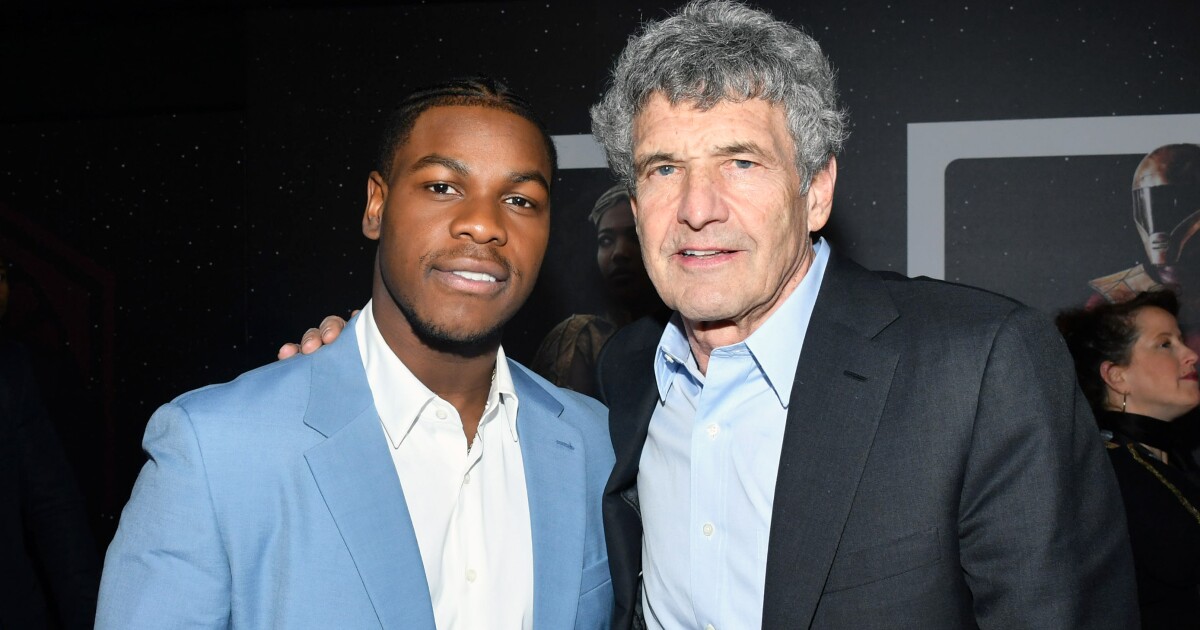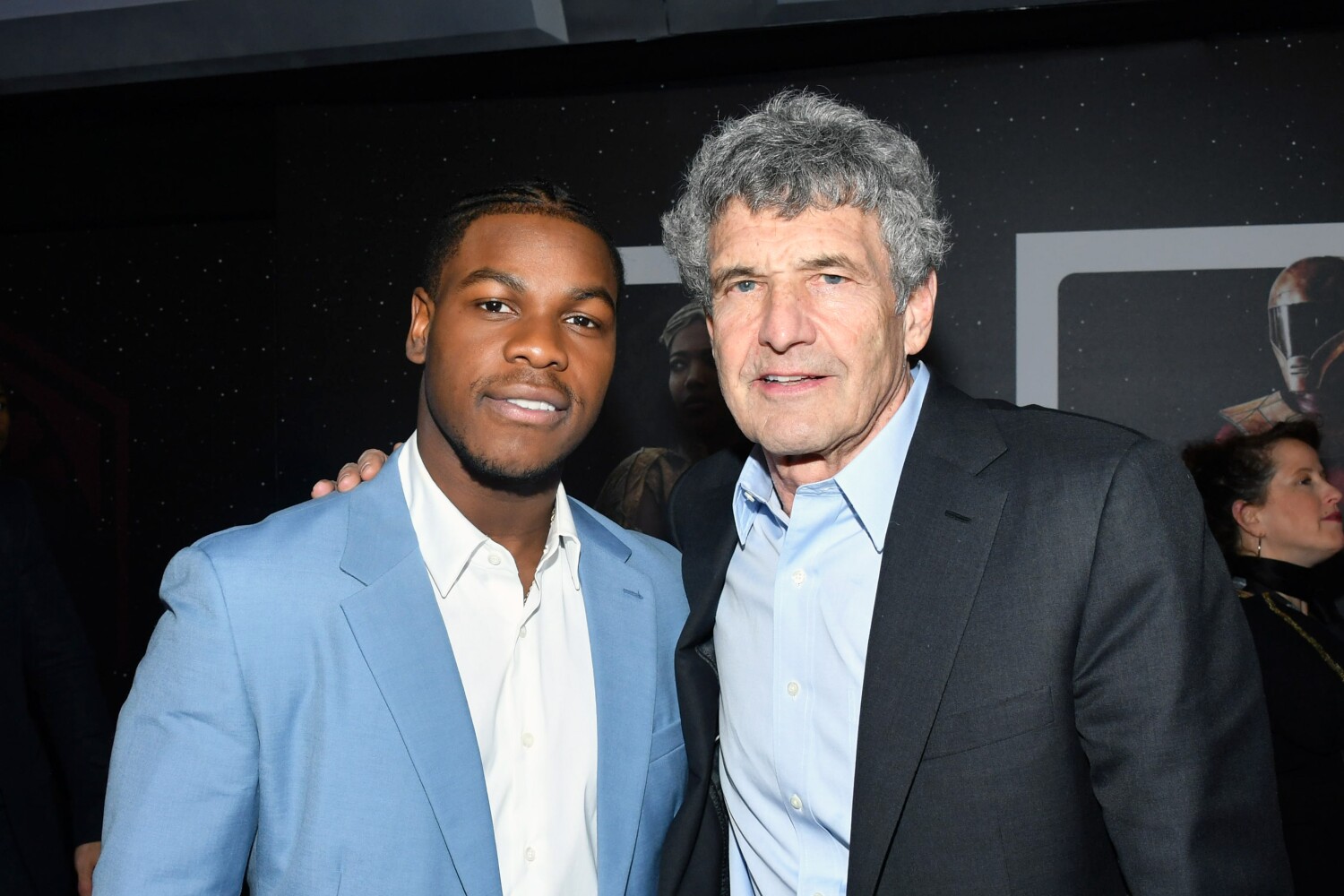
Top Disney movie executive Alan Horn to retire in December
As chairman of Walt Disney Studios, Alan Horn oversaw a remarkable period of box office success, releasing blockbusters including Marvel superhero films, Pixar gems and the later entries in the “Star Wars” saga.
Still, Horn was often loath to take credit for the company’s success, and would sometimes downplay his role. With a note of humility, he referred to himself as “just a janitor with a reel of keys” in a 2014 New York Times interview.
Now Horn — who led a portfolio of studios including Marvel, Lucasfilm, Pixar and Disney’s own live action and animated operations — is set to officially hand in those keys.
The executive, considered one of Hollywood’s elder statesmen at 78, will retire at the end of this year following a career that spanned nearly five decades.
“It has been my great privilege and pleasure to be able to spend these past 50 years helping creative people tell stories that move, entertain, and connect audiences around the world — and a dream come true to have the chance to do it at Disney, no less,” Horn said in a statement Monday.
Horn’s retirement hardly comes as a surprise and completes a long in-the-works transfer of power to Disney film executive Alan Bergman, who took over as the studio’s sole chairman last year. That move came after Disney made Horn and Bergman co-chairmen in May 2019, setting the stage for the eventual transition.
Disney does not plan to name a replacement for Horn, whose current title is chief creative officer of Disney Studios Content.
Horn’s exit comes amid a broader changing of the guard at the Burbank-based entertainment colossus, which is undergoing an accelerated transformation to focus on growing streaming businesses, including Disney+ and Hulu.
Executive chairman Bob Iger, who was Disney’s chief executive for 15 years, is leaving the company at the end of the year after handing the CEO reins to Bob Chapek in February 2020. Also on the way out are longtime public relations chief Zenia Mucha and general counsel Alan Braverman. Other prominent departures have included Searchlight Pictures chairs Steve Gilula and Nancy Utley.
“It has truly been a privilege to work with Alan over the years,” Chapek said in a statement. “He’s led an exceptionally talented Studio team that is the best in the industry, creating some of the most beloved and iconic films of our time, and he will forever be a cherished member of our Disney family.”
When Horn joined Disney in 2012, it was considered a third act career comeback. His hiring by Iger came after Horn was forced to retire from Warner Bros., where he served as president and chief operating officer under Barry Meyer. He oversaw splashy Hollywood offerings including the Harry Potter films and Christopher Nolan’s Batman movies, as well as hits like “Happy Feet” and “Oceans 11.”
But he was pushed out at age 68 at a time when parent company Time Warner Inc. wanted a fresh perspective at the studio. Horn made no secret of his displeasure with the timing of his exit.
“As I like to say, and I say this with a smile, they wanted younger and arguably better-looking management,” he told The Times after his ouster.
Iger hired Horn to lead the studio at a time when the company was in need of its own revival and renewed stability after the ouster of Rich Ross. Disney in recent years had lost some of its sheen after flops including “John Carter” and “Mars Needs Moms.” When Horn joined, Disney was in production on “The Lone Ranger,” which would famously bomb.
Disney was a natural fit for Horn, who had gravitated toward family entertainment franchises while at Warner Bros., rather than R-rated comedies such as the “Hangover” series.
During Horn’s reign under Iger, the Disney studio enjoyed a period of unusually consistent success at the box office in an industry known for volatility, and at a time when several big rivals were struggling to contend with dramatic shifts in audience behavior.
Unlike other studios that were still including low-budget horror movies and R-rated comedies in their lineups, Horn’s release schedule consisted almost exclusively of high-profile, big-budget movies with wide demographic appeal. The studio dominated the box office in terms of domestic market share.
At both Disney and Warner Bros., Horn played a significant role in the movie business’ shift toward the international box office and so-called “tent-pole” films designed to become big global events — a strategy that has made Disney the envy of other studios in recent years.
At Disney, Horn’s job was more complicated than just running a major studio. He was tasked with managing successful and independent-minded leaders of subsidiaries, including John Lasseter of Pixar and Disney Animation (who exited in 2019 amid a sexual harassment scandal), Kevin Feige of Marvel Studios and Kathleen Kennedy of Lucasfilm.
He had to strike a balance between providing leadership without micromanaging his direct reports. The job of running the studios became even bigger in 2019, when Disney completed its $71-billion acquisition of 21st Century Fox assets, including the 20th Century Fox movie studio and the specialty film label Fox Searchlight (now 20th Century Pictures and Searchlight Pictures). Disney’s decision to have Horn and Bergman share the co-chairman role in part reflected the expansion of the studio.
Horn is known for old-school values, which fit with Disney’s family-friendly brand. He’s known to want movies to downplay violence toward women and avoid gratuitous sex, obscene language and smoking. He told The Times in a 2000 interview that he probably wouldn’t have green-lighted “Natural Born Killers,” the Oliver Stone movie that Warner Bros. released before Horn’s tenure.
An environmental advocate, he co-founded the Environmental Media Assn. with his wife, Cindy, and was a longtime board member of the Natural Resources Defense Council, which he chaired from 2018 to 2020. At Warner Bros., Horn once became incensed over a detail in a script he read in which a character drove a Hummer. He encouraged a production executive to find another car.
“I told him, ‘We don’t have to change it to a Prius. Let him drive a Porsche,’” Horn told The Times in 2003. “There are plenty of other cool cars that could make a statement that’s right for the movie.”
An Air Force veteran and Harvard MBA, Horn’s rise began when a friend introduced him to Hollywood heavyweight Jerry Perenchio, who gave him his first entertainment industry job at Tandem productions, co-founded by “All In the Family” creator Norman Lear, eventually becoming chairman and CEO of Lear and Perenchio’s Embassy Communications.
He later briefly joined the Hollywood studio ranks at 20th Century Fox as president and chief operating officer. But his career turbocharged in 1987 when he teamed with Rob Reiner and other executives to found Castle Rock Entertainment, which produced film including “When Harry Met Sally” and the TV comedy “Seinfeld.”
Stay connected with us on social media platform for instant update click here to join our Twitter, & Facebook
We are now on Telegram. Click here to join our channel (@TechiUpdate) and stay updated with the latest Technology headlines.
For all the latest Entertainment News Click Here
For the latest news and updates, follow us on Google News.


